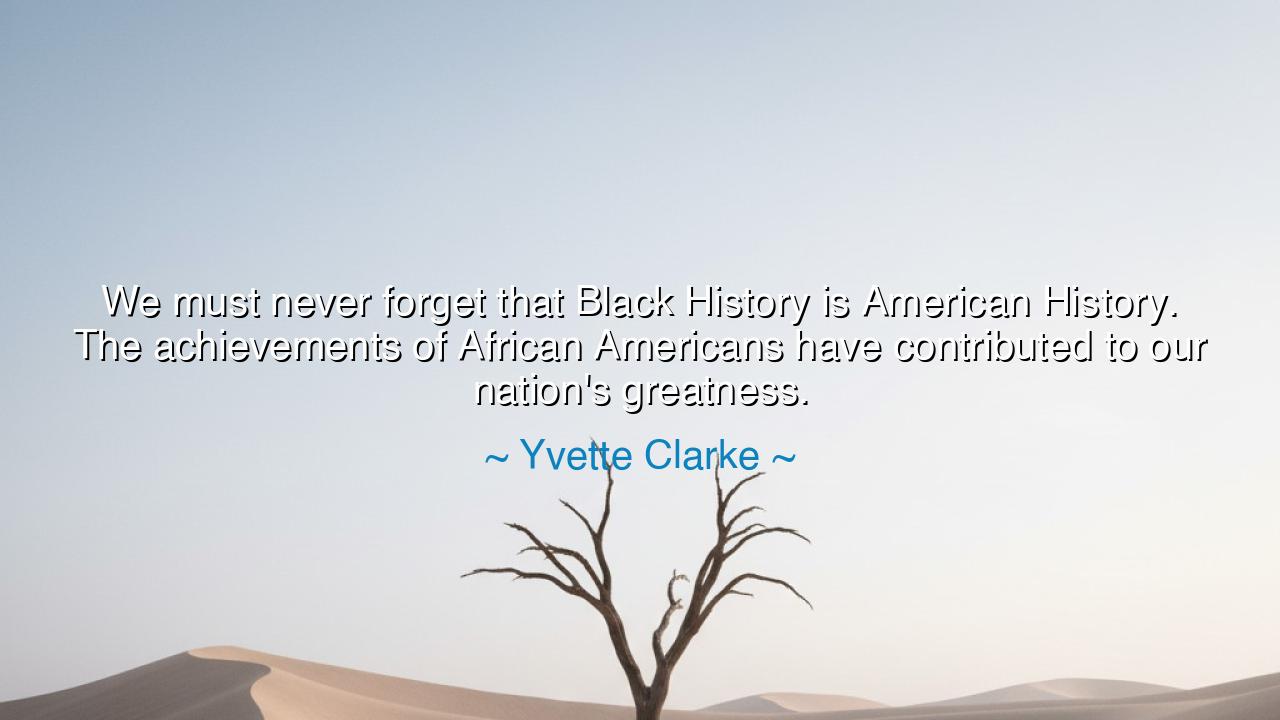
We must never forget that Black History is American History. The
We must never forget that Black History is American History. The achievements of African Americans have contributed to our nation's greatness.






When Yvette Clarke declared, “We must never forget that Black History is American History. The achievements of African Americans have contributed to our nation's greatness,” she spoke with the clarity of one who understands that the story of a people is inseparable from the story of a nation. Her words remind us that history is not a series of isolated threads, but a woven tapestry in which every contribution strengthens the whole. To overlook the accomplishments of African Americans is to tear holes in the fabric of understanding, diminishing both memory and identity. Black History, Clarke asserts, is not ancillary—it is foundational to the history of the United States.
The origin of this insight lies in Clarke’s work as a public servant and advocate, promoting awareness and inclusion. She recognizes that for centuries, the stories of African Americans were marginalized, minimized, or excluded from the public record. Yet their influence, whether in science, politics, the arts, or social reform, has been profound. From the invention of the traffic light by Garrett Morgan to the leadership of civil rights icons like Dr. Martin Luther King, Jr., African Americans have shaped the contours of the nation. Clarke emphasizes that these achievements are not separate footnotes, but essential chapters in the collective story of America.
Her statement resonates with the wisdom of the ancients, who understood that the strength of a society is measured by the acknowledgment of all who contribute to it. The Greeks and Romans chronicled the deeds of citizens not only for individual glory but to show how collective effort sustains the state. Clarke’s words echo this principle: by recognizing African Americans as integral to the nation’s history, we honor the truth of shared struggle, innovation, and progress. Memory and recognition are not mere acts of acknowledgment—they are acts of justice and preservation.
Consider the story of Madam C.J. Walker, who rose from the bonds of poverty and discrimination to become the first female self-made millionaire in the United States. Her contributions extended beyond business; she became a philanthropist, activist, and mentor, shaping opportunities for countless African Americans. Her life demonstrates that the achievements of African Americans are not peripheral—they are transformative, affecting society as a whole. By including such narratives in the nation’s history, Clarke reminds us that understanding greatness requires acknowledging all contributors.
The deeper meaning of Clarke’s quote is a call for inclusivity in the telling of history. To separate Black History from American History is to distort the narrative, creating an incomplete and biased account. African Americans have fought, endured, and innovated in ways that have defined the nation’s identity. From the arts of Duke Ellington and Langston Hughes to the political leadership of Barack Obama, these achievements have shaped culture, society, and governance, enriching the nation’s legacy for all citizens.
Clarke’s reflection also carries a moral imperative: knowledge of history is inseparable from justice. By studying and celebrating Black History as American History, we confront oppression, recognize resilience, and cultivate understanding across generations. It is a recognition that freedom, progress, and innovation are built collectively, and that no society thrives when the contributions of a segment of its people are ignored. Historical literacy becomes not only an educational pursuit but a foundation for empathy and equity.
O listener, take this teaching to heart: study the full story, honor all voices, and ensure that the achievements of African Americans are recognized as central to the nation’s history. Share these narratives, reflect on their significance, and allow them to guide your understanding of society. When we integrate these contributions into our consciousness, we build a more accurate, just, and unified view of the past, one that informs the present and inspires the future.
In the end, Yvette Clarke reminds us that the greatness of a nation is inseparable from the greatness of its people. Black History is not a separate chapter, but a vital thread in the story of America. To forget it is to diminish the nation itself; to honor it is to embrace truth, justice, and the richness of collective achievement. By remembering, teaching, and celebrating, we ensure that history reflects reality, and that every contribution, courage, and triumph is woven into the enduring legacy of a united people.






AAdministratorAdministrator
Welcome, honored guests. Please leave a comment, we will respond soon